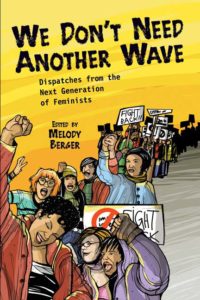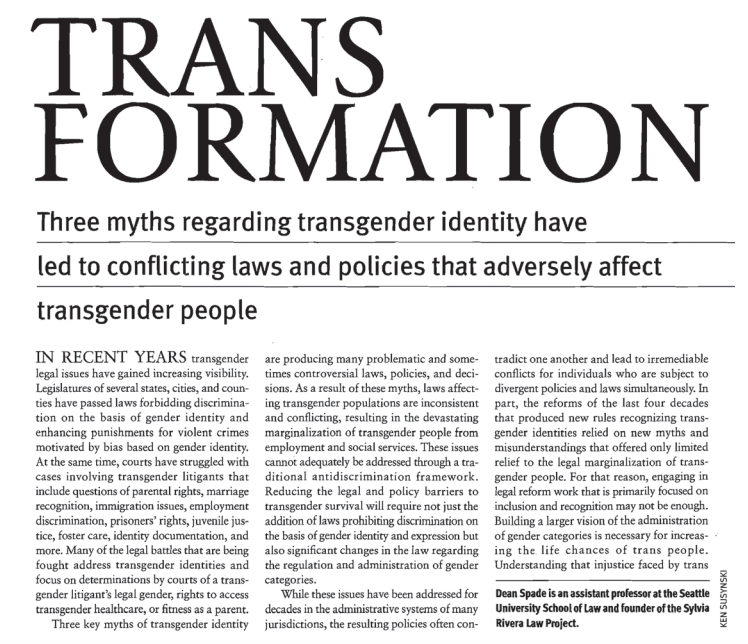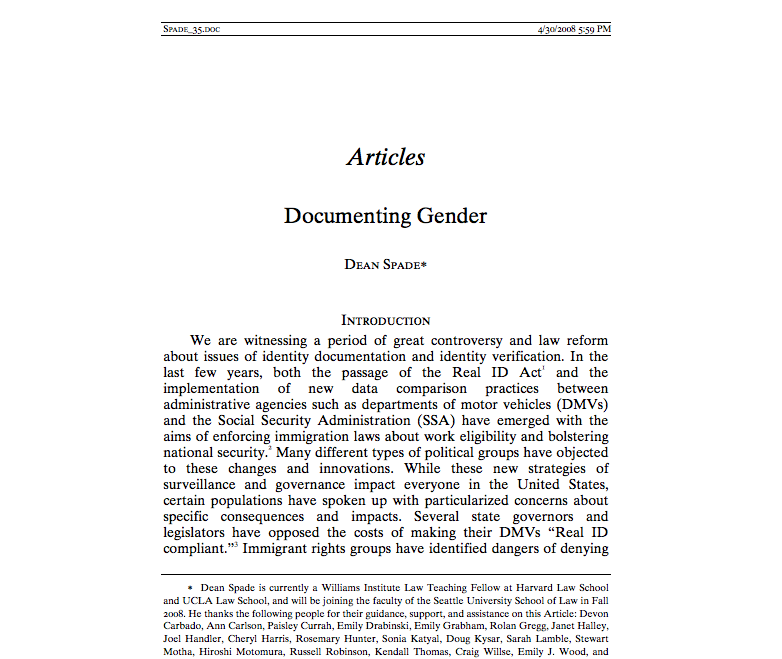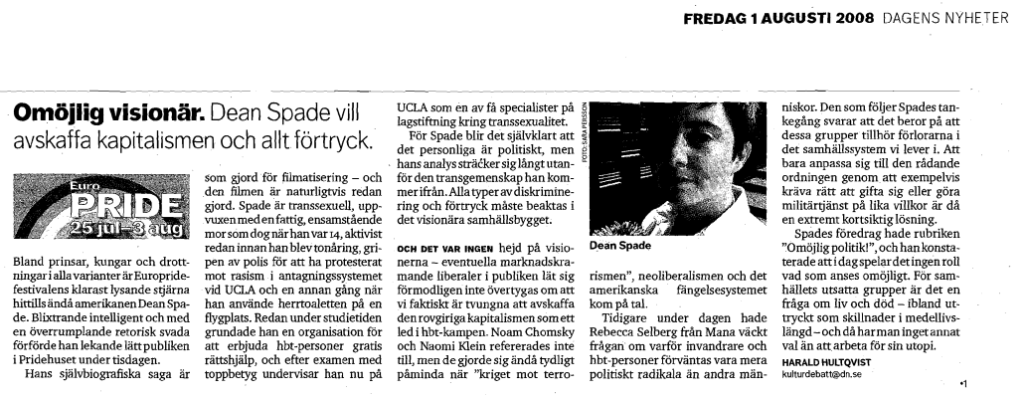Trans/formation
Can You Hear Me Now? co-authored with Colby Lenz
Colby Lenz and I co-authored this article “Can You Hear Me Now?” originally published by CommunityChange.org. Read the full-text below.
Can You Hear Me Now?
By Colby Lenz and Dean Spade
Many of us share a set of concerns or complaints about cell phones. You hear them all the time. Nobody makes plan anymore ahead of time. People talk on cell phones everywhere instead of looking around and being present. The constant noise of cell phone use is annoying and often rude and inappropriate. Cell phones (including those with email) encourage people to work more, losing any sense of work-life balance.
These are solid, important complaints and we have more concerns about cell phones that we want to add to the list. We hope to re-frame the conversation about this suddenly ubiquitous technology in a broader and more urgent context. Here are six problems to consider:
- Cell phones are just a new consumer luxury item masquerading as a need. A little over a decade ago we all lived life without them. We survived flat tires, street protests, non-profit jobs, family illness and our social lives without Blackberries and Razrs. Cellphones represent a new level of privatization of phone service. Along with other ways we have punished the poor, pay phones are now on the decline, making access to phones more difficult for people without cash or credit. We have moved from sharing phones (party-lines), to household lines, to individual lines. This means more money for big business. What does it mean that so many people committed to a more socialized politics are giving so much money to the telecommunications industry? What else might we do with that money if we let go of these private status symbols and shared phones like we used to?
- If everyone else held a piece of plastic filled with cancer-causing chips next to their head all day long would you? Our friends who use cell phones tell us their ears hurt. Studies worldwide suggest cell phones are linked to brain cancer, research that the phone industry works its magic to quiet or stop. We know very well that we cannot trust big business with our health and the health of our loved ones. What’s convenient now might be very painful later. We want you to live and be well.
- Cell phones don’t grow on trees. They are made of plastic, are “disposable” (meaning made to break and be lost) and millions of them are thrown into landfills every week. Coltan, a key material that makes them work, is mined in the Congo under horrendous conditions, resulting in an estimated 3.2 million deaths since 1998, deforestation of the region and birth defects from water contamination. Like all other consumer goods, the people who use and enjoy this luxury are mostly clueless about the extreme exploitation and violence required to create them.
- Bees are the key to our food and our survival. Recent studies found that commercial bee populations suddenly declined 60-70% in the US and scientists theorize cell phone signals as a very possible cause. Scientists have proven that power lines can affect bee behavior and destroy hives and the sudden increase in hive death from cell phone signals may seriously endanger plant life and food sources for bees. While mass-produced crops like wheat and corn are pollinated by wind, some 90 cultivated flowering crops rely mostly on honeybees. According to a Cornell University study, honeybees pollinate every third bite of food ingested by Americans.
- Cell phones are recording devices used to criminalize people. Buying and using cellphones supports surveillance culture and promotes state violence. Not only can every one of your conversations (whether your phone is next to your ear or off in your bag) be heard and recorded by the telecommunications industry and the state, it can also be used as evidence against you and anyone you speak to. And even if you personally are not targeted, your cell phone dollars support policing, surveillance and imprisonment of criminalized classes of poor people and people of color.
- Scarcity and insecurity starts at home. The emotional economy of cell phones also concerns us. Capitalism makes us feel insecure and competitive for seemingly scarce resources. The same drive to consumerism and buying cell phones is the same emotional context of fear that drives war. This national-personal insecurity matrix is visible when people buy cell phones because they’re afraid of getting in an accident or being a crime victim and needing to reach the police. It is visible when people feel they have to have a cell phone for their job, to feel professionally important. It is visible when people fear that if they don’t have one, then their friends will stop calling them and they will be disconnected from social life. It feeds capitalist imperatives: every desire must be met immediately and we must always be working and striving and climbing (socially, professionally, etc.) without rest. The mindset of the cell phone is part of our brutal economy.
But why single out cell phones for these concerns? Many other products harm the environment and mobilize our minds, bodies and social connections in the interest capital. So many products have negative health impacts and so many can be used as tools of state terror. Cell phones are not unique these ways. But what concerns us is the uncritical embrace of cell phones, especially by people on the left and self-proclaimed anti-capitalist activists. While we have an ongoing critique of cars and real estate and sweatshop-produced clothing and many other things, this gigantic, new and extremely pervasive shift in consumption goes almost un-critiqued in terms of these ramifications.
This is a call for an analysis of the operation of this technology and the telecommunications market, using all the critical skills that radical activists have developed. This is an invitation to join us and get rid of your cell phone — or don’t get one in the first place. Help us resist the allures of this technology and support each other in remembering other ways to communicate, organize and connect with one another. Like all of our other endeavors to create a better world, this is not about perfection. We are all caught in this economy, engaging in consumer practices that are harmful, but we can still identify and act on the concentrations. It is more than possible to live without a cell phone – some of us find life way better without them.
Read more like this at Enough: The Personal Politics of Resisting Capitalism, a collaborative project with Roan Boucher.
Two Special Issues of Sexuality Research and Social Policy: Journal of NSRC
Paisley Currah and I co-edited the two-part special issue “The State We’re In: Locations of Coercion and Resistance in Trans Policy” in Sexuality Research and Social Policy: Journal of NSRC Vol. 4. No. 4 (December 2007) and Vol. 5, No. 1 (March 2008).
Read the introduction to the first volume here and read the introduction to the second volume here. A table of contents for both issues and links to most of the articles are below.
Part 1 (December 2007): Table of Contents
Introduction to Special Issue The State We’re In: Locations of Coercion and Resistance in Trans Policy, Part 1, Paisley Currah and Dean Spade
Unraveling Injustice: Race and Class Impact of Medicaid Exclusions of Transition-Related Health Care for Transgender People, Pooja S. Gehi and Gabriel Arkles
Sex Workers, Fem Queens, and Cross-Dressers: Differential Marginalizations and HIV Vulnerabilities Among Three Ethnocultural Male-to-Female Transgender Communities in New York City, Sel Julian Hwahng and Larry Nuttbrock
Seeking Refuge Under the Umbrella: Inclusion, Exclusion, and Organizing Within the Category Transgender, Megan Davidson
Transgender Health Benefits: Collateral Damage in the Resolution of the National Health Care Financing Dilemma, R. Nick Gorton
Momentum: A Photo Essay of the Transgender Community in the United States Over 30 Years, 1978–2007, Mariette Pathy Allen
Part 2 (March 2008): Table of Contents
Introduction to Special Issue The State We’re In: Locations of Coercion and Resistance in Trans Policy, Part 2, Dean Spade and Paisley Currah
Talking, Gawking, or Getting It Done: Provider Trainings to Increase Cultural and Clinical Competence for Transgender and Gender-Nonconforming Patients and Clients, Christoph Hanssmann, Darius Morrison, and Ellery Russian
Gender Identity and Hate Crimes: Violence Against Transgender People in Los Angeles County, Rebecca L. Stotzer
The Nonprofit Industrial Complex and Trans Resistance, Rickke Mananzala and Dean Spade
And by the Way, Do You Know He Thinks He’s a Girl? The Failures of Law, Policy, and Legal Representation for Transgender Youth in Juvenile Delinquency Courts, Jody Marksamer
Documenting Gender
I wrote Documenting Gender, published in Hastings Law Journal in 2009. This article was awarded the 2008 Dukeminier Award and reprinted in UCLA Journal of Sexual Orientation and Gender Identity Law. You can read it here.
In the News: Dagens Nyheter (in Swedish)
The Nonprofit Industrial Complex and Trans Resistance, with Rickke Mananzala
I co-authored “The Non-Profit Industrial Complex and Trans Resistance” with Rickke Mananzala in Sexuality Research and Social Policy: Journal of National Sexuality Resource Center published in December 2007. You can read it here.
Methodologies of Trans Resistance
Here is a chapter I contributed to the Blackwell Companion to LGBT/Q Studies (2007) called “Methodologies of Trans Resistance.”
For Lovers and Fighters
 My essay “For Lovers and Fighters” was published in We Don’t Need Another Wave: Dispatches from the Next Generation of Feminists, edited by Melody Berger (2006).
My essay “For Lovers and Fighters” was published in We Don’t Need Another Wave: Dispatches from the Next Generation of Feminists, edited by Melody Berger (2006).
A Polish translation of this essay is available here.
A Spanish translation is available here.
Compliance is Gendered: Struggling for Gender Self-Determination in a Hostile Economy
My article “Compliance is Gendered: Struggling for Gender Self-Determination in a Hostile Economy” was published in Transgender Rights: History, Politics and Law, edited by Paisley Currah, Shannon Minter, Richard Juang (2006).


